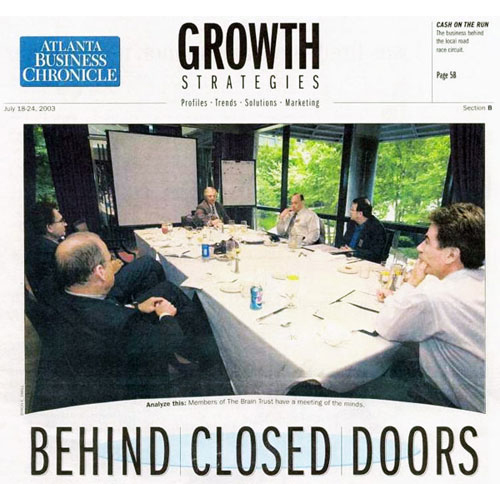Atlanta Business Chronicle
We present below a special story published in the Atlanta Business Chronicle on how the CEO Peer Group of The Brain Trust, has helped CEOs, presidents and entrepreneurs face business risks and pull their companies back to profit from the brink of disaster.
Behind Closed Doors
Where does the boss go when he needs unfettered advice, a reality check, even a shoulder to cry on?
– Tom Barry, Contributing Writer for the Atlanta Business Chronicle
“No question about it,” Cross said. “Soon after I bought the company (in early 2000), everything that could go wrong went wrong. But Brain Trust members helped me think differently about solving our problems. In fact, they made me rise to a whole new level. Now we’ve restructured the company and have turned things around.”
The old adage that there are no schools for CEOs needs refining. Training grounds of various stripes have cropped up, the Brain Trust among them. The Atlanta group is composed of 16 CEOs and presidents who meet for a half-day each month to share ideas, hear outside speakers, and discuss common challenges and problems.
Other groups include The Executive Committee and Renaissance Executive Forums, national organizations with Atlanta chapters that bring top-level executives and entrepreneurs together.
There’s no time like the present. Such practical, rubber-meets-the-road organizations thrive in a down economy, said Atlanta marketing consultant Alf Nucifora, president of Nucifora Consulting Group.
“It was fine being a CEO in the 1990s, when you could do well just by answering the telephone,” he said. “With the economic downturn we’ve had over the last two years, though, a lot of CEOs and business owners are asking, ‘What can I do to protect my business?”
One answer to CEO/entrepreneur angst: Share common experiences. “It’s especially true for CEOs from smaller companies, those that generate between $5 million and a couple hundred million in revenue,” Nucifora said. “The larger companies have expensive consultants and internal teams to address issues. Smaller companies don’t.
Tom Cramer founded The Brain Trust nine years ago and serves as its co-chairman. The intellectual genesis was Napoleon Hill’s book “Think & Grow Rich,” which posited the notion of putting like-minded business leaders together in a common cause.
“I’d been the president of four corporations over 25 years,” said Cramer, who today is CEO of Hot Glove Inc. in Woodstock. “I always got a lot of value out of meeting informally with my peers — company presidents and business owners. I liked the idea of sharing ideas and solutions with them and in turn getting their input. It’s just a very powerful way to learn. And I wanted to do it on a larger scale.”
“The more challenges we have, the more valuable we are to one another,” Cramer said, adding that the core group has remained intact since the outset. “In a down economy, we’re able to handle issues better because we rely on one another’s advice. Imagine having an idea or challenge that you can bounce off a dozen or so really bright minds and get immediate feedback. Where else could you do that so efficiently and effectively?”
Candor is the hallmark of leadership groups. Members are chosen in part because they do not compete in the marketplace against other members, so they’re able to share sensitive information, assured that advantage will not be taken or confidentiality betrayed.
“Our groups discuss P-and-L statements, the problems they have with employees and even difficulties caused by the CEOs themselves,” said Larry Hart of the Atlanta chapter of The Executive Committee (TEC), a San Diego-based organization devoted to chief executive development. “Sometimes a problem stems from the head person himself.”
Candor can be jolting, especially to CEOs not used to hearing it.
“I’ve seen CEOs in tears,” Hart said. “I remember one CEO describing an idea he had and everybody getting real quiet. Then one guy says, ‘That’s the stupidest thing I’ve heard out of your mouth in the last two years.’ But really, that’s the thing. There are few places where these executives can have a real conversation with peers.”
Cross, for one, values the frank feedback he gets from his fellow members, who know him well. “I know they won’t take any crap from me,” he said.
When Cross joined The Brain Trust, shortly after its inception, he was a partner in another Atlanta publishing company. In February 2000, Cross acquired Zane Publishing, an electronic publisher specializing in the K-12 educational market, after vetting the deal with Brain Trust members. “I made a presentation to them as if they were my board of directors, even though I didn’t have a board,” Cross said. “They urged me to go ahead and buy the company.”
Shortly thereafter, “all hell broke loose,” Cross said. “Our distribution channel totally fell apart.” Revenue, which had been running $3 million to $4 million a year, dropped “to almost nothing in eight months.”
“We were showing red ink like crazy,” he said.
Without mentoring from Brain Trust members, Cross believes he would have failed.
“I was so much in the forest that I could hardly see the trees,” he said. “But one day a month I could get away from the hell I was facing and hear new ideas. Our members have maybe 20 years of business experience apiece, so all told I had access to over 200 years’ worth of wisdom. You can’t pay money for that.”
Beyond insight, there was critical psychological support. “It would have been emotionally devastating to go through what I did without their help,” he said.
Cross has restructured and refocused Zane Publishing, which is now turning a profit. “About five months ago, we began seeing some light at the end of the tunnel,” he said. “We’re back on track.”
Almost perversely, each month Cross didn’t want to go to the Brain Trust meeting. He routinely complained to his wife, Julie, that with so many problems, he simply didn’t have the time.
“It got to be a joke between us,” he said. “She’d say, ‘You are going to go. Each time you come back refreshed, with new ideas.’ ” His wife was right. “Each meeting helped me survive for another month,” Cross said. “I walked out of every one thinking, ‘How could I have thought of not coming?’ ”
The difficulties CEOs face often have a familiar ring.
“No matter what type of business it is or the size, the challenges are basically the same,” Hart said. “I tell prospective members that there are no new problems out there, just your version of the same problem.”
Employee dilemmas abound, Cramer said. “One thing I’ve learned is that business is all about people, and so that’s a big focus for us. If you get the people equation right, everything else works. If you don’t have high-quality, motivated people involved, though, your business won’t work.”



